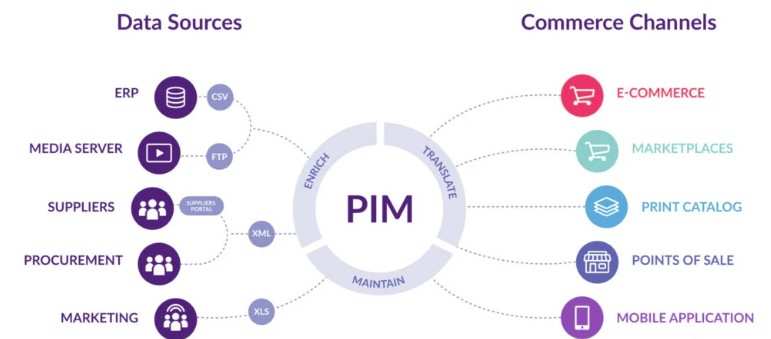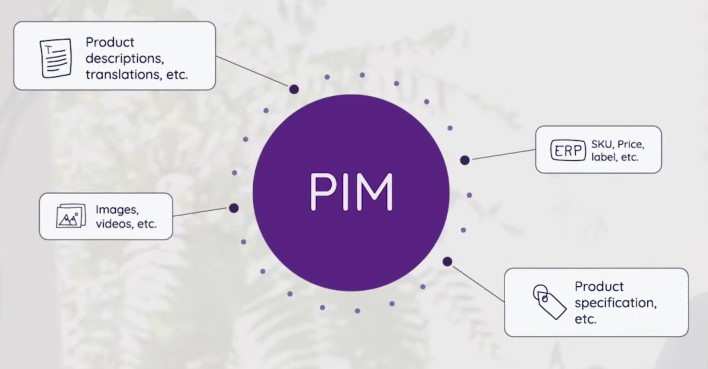Contents
Product Information Management (PIM) allows an individual or a team to gather data about products in a centralized way. As a result, all the channels of information about the products will not have any duplicate or inaccurate data. Apart from the collection of data, technology platforms for PIM solutions offer organizing, collaborating, and enriching ability to product’s digital asset and its data. This cloud-based software enables streamlined management of product information and digital assets for various e-commerce websites.

Why you should choose PIM: Benefits
Selecting a Product Information Management (PIM) system has several benefits for companies looking to improve their competitiveness in the market and operational effectiveness.
- Quicker Time to Market: Quicken the release schedule for upgrades and new goods. PIM cuts down on the time spent entering and correcting data by hand. Moreover, it adapts effectively to opportunities and changes in the market.
- Enhanced Allegiance to Brand: Ensure that the product information is accurate and consistent throughout all sales and marketing platforms. Users gain the trust of clients by offering accurate and thorough product information. Moreover, the entire consumer experience is improved leading to recurring business and brand loyalty.
- Increased Prospects for Sales: Cross-selling and upselling possibilities may be found and promoted by using precise product data.
- Enhanced Performance Capabilities: Simplify vital processes to cut down on manual mistakes and duplications. Improve departmental (e.g., marketing, sales, supply chain) collaboration.
- Improved Quality of Product Data: Make certain that all product details are true, comprehensive, and current. Respect industry norms and guidelines to lower the chance of non-compliance.
How to choose PIM Software?
What are your goals? Having a pinpoint understanding of what your business needs helps in determining the type of features you require in your PIM. Such features can be a centralized management system and real-time inventory tools.
Ensure that the new system you are implementing in your entity is integrating well with your existing system. Apart from that, check the prices of PIM solutions and cross-check them with your budget. Scalability is another aspect that business owners continuously need to evaluate as your current sets of PIM solutions may require upgrades.
Lastly, give a proper inspection of the customer service so that whenever a complex problem occurs, your helpline works.
What is Different About Various PIM Systems?
Different Product Information Management (PIM) systems are tailored to various sectors and business demands, and they differ in a number of important ways.
- Wide range of feature sets and functions
While some PIM systems concentrate on fundamental data management and integration, others provide more sophisticated features like AI-driven insights, automatic data enrichment, and a wide range of customization choices.
- Difference in deployment

PIM platforms can be hybrid, on-premises, or cloud-based. On-premise systems give more control and customization, while cloud-based solutions are more scalable and need less money upfront. Hybrid versions provide flexibility and strong performance by combining the greatest features of both worlds.
- Quality control and data management
Proficient PIM systems provide advanced instruments to guarantee data integrity, fullness, and adherence to industry norms. They have functions like enrichment procedures, deduplication, and data validation.
- User interface and Experience
Productivity may be increased and the learning curve considerably lowered with an intuitive UI. Businesses that value user experience tend to favor systems with clear and simple menus and dashboards.
- Levels of integration
Certain PIM solutions provide for easy integration with other corporate systems, such as eCommerce platforms, ERP, and CRM, which promotes efficient data flow and breaks down operational silos.
Final Words
Ready to improve the way you handle your product data? Pick PIMinto for its easy and smooth integration that anyone in e-commerce can learn. One of its main highlight, the power to combine product information management alongside digital asset management makes it a powerful platform. The software’s easy-to-use interface, modern product portals and AI capabilioties makes PIMinto a great option




